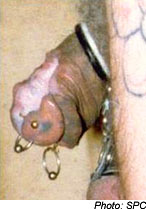Superincision
Superincision, perhaps one of the rarest male modifications is a form of bisection that's opposite to a subincision, splitting only the top half of the shaft and leaving the tissue below the urethra intact. Superincions are far more invasive and dangerous than subincisions, and as a result are not only rare in the modern world of body modification, but on a historical level as well.
Most references to "superincision" in the medical literature are actually referring to superincision circumcision, and while there is some historical reference to "true" superincision procedures, most accounts that are specific in their detail make it clear that they are referring to incisions of the foreskin only.
(Note: the picture on the left shows The Incredible Til on his way to his inversion project)
